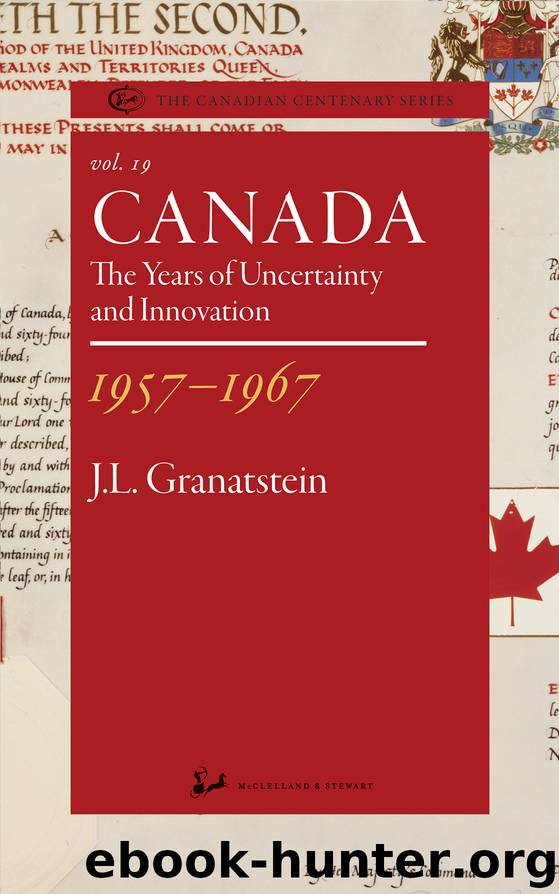Canada 1957-1967 by J.L. Granatstein

Author:J.L. Granatstein [Granatstein, J.L.]
Language: eng
Format: epub
Publisher: McClelland & Stewart
Published: 2016-09-27T00:00:00+00:00
IV
The Saskatchewan experience did not frighten off all the national parties. John Diefenbaker’s Progressive Conservatives, who had probably benefited from the issue in the 1962 federal election in Saskatchewan, did not count medicare among their platform pledges, but the NDP did. Led by Tommy Douglas, the party could scarcely have done otherwise, but medicare was in fact a long-standing CCF pledge. Insurance against illness was an age-old Grit promise too, dating back to the 1919 convention that had chosen Mackenzie King as leader. But despite years in power, the Liberals had not proceeded with legislation, although the issue had been studied closely, particularly during the great wartime burst of interest in social legislation. Douglas’s decision to proceed with medicare in Saskatchewan in 1959-60 had finally forced the Liberals off the fence, and in the 1962 and 1963 election campaigns the Pearson-led party had promised to implement medical insurance. But there was little immediate effort to redeem the pledge as the Pearson government after 1963 devoted its reformist energies to creating the Canada Pension Plan.
In June 1964, however, the first volume of the report of the Royal Commission on Health Services was tabled in Parliament. The Chief Justice of Saskatchewan, Emmett Hall, and his fellow commissioners had been appointed by Diefenbaker three years before to study the delivery of health services, in part at least as a way of delaying pressures building up in the Department of National Health and Welfare for major and costly federal actions in the field, not excluding medicare.87 Hall had tackled the task with thoroughness and zeal, retaining an able research staff, dealing extensively with the CMA to ascertain the profession’s position, and holding hearings.88
His report was startling to almost everyone. The large volume dealt with all aspects of medical and dental care and pharmaceutical needs, but what drew most attention was the commission’s call for joint federal-provincial action for the provision of physicians’ services. In effect, this was Saskatchewan-style medicare, and as Hall later recalled, the key point in his report was the call for universality.89 Predictably, the CMA objected. The general secretary, Dr. Kelly, told Hall that his organization agreed with “85% of your proposals” but refused to accept that what was needed was a series of Saskatchewan-type plans, and the CMA’s retiring president denounced the commission’s recommendation as compulsory, monopolistic, and providing no guarantee that doctors could practise outside the plan.90 It was almost as if Saskatchewan medicare had never happened. What the Pearson government would do with the report was uncertain.
In 1964, after the Saskatchewan election that toppled Lloyd and the NDP, a number of key civil servants in Regina began to look elsewhere for work. One was Al Johnson, the Deputy Provincial Treasurer, who was enticed to the Department of Finance in Ottawa by R.B. Bryce, now the deputy minister. Bryce had intended to use Johnson on federal-provincial fiscal questions, but when his minister, Walter Gordon, realized that Johnson had been involved in the medicare issue, he quickly assigned the new
Download
This site does not store any files on its server. We only index and link to content provided by other sites. Please contact the content providers to delete copyright contents if any and email us, we'll remove relevant links or contents immediately.
Fanny Burney by Claire Harman(25784)
Empire of the Sikhs by Patwant Singh(22172)
Out of India by Michael Foss(16312)
Leonardo da Vinci by Walter Isaacson(11903)
Small Great Things by Jodi Picoult(6095)
The Six Wives Of Henry VIII (WOMEN IN HISTORY) by Fraser Antonia(4790)
The Wind in My Hair by Masih Alinejad(4424)
The Lonely City by Olivia Laing(4120)
The Crown by Robert Lacey(4105)
A Higher Loyalty: Truth, Lies, and Leadership by James Comey(4033)
The Iron Duke by The Iron Duke(3639)
Millionaire: The Philanderer, Gambler, and Duelist Who Invented Modern Finance by Janet Gleeson(3569)
Sticky Fingers by Joe Hagan(3454)
Alive: The Story of the Andes Survivors by Piers Paul Read(3310)
Papillon (English) by Henri Charrière(3269)
Joan of Arc by Mary Gordon(3258)
Stalin by Stephen Kotkin(3086)
Aleister Crowley: The Biography by Tobias Churton(3019)
Ants Among Elephants by Sujatha Gidla(2924)
